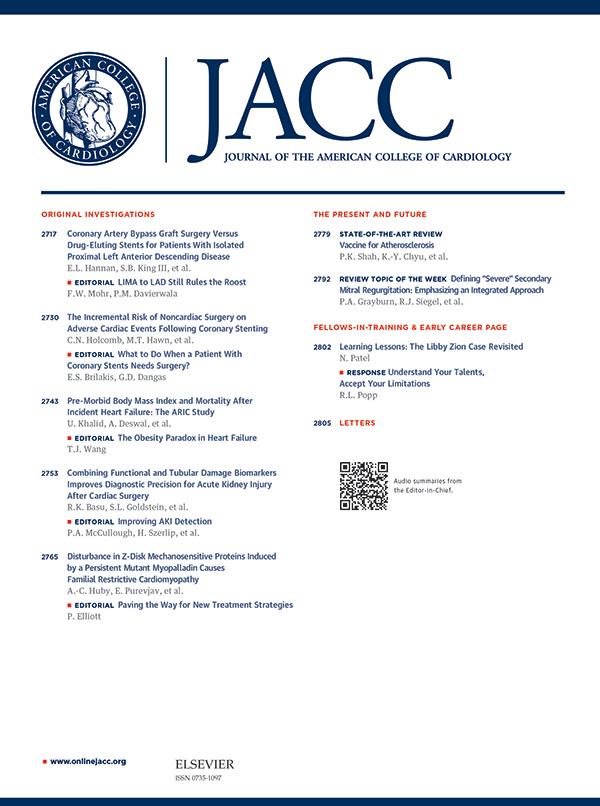私募股权收购美国医院后的心力衰竭护理和结果
IF 21.7
1区 医学
Q1 CARDIAC & CARDIOVASCULAR SYSTEMS
引用次数: 0
摘要
在过去十年中,私募股权公司迅速收购了美国的医院,并越来越多地投资于心脏病学。然而,对于私募股权收购医院如何影响心力衰竭患者的护理和预后,人们知之甚少。本研究的目的是评估私募股权公司收购美国医院后,与匹配的对照医院相比,心力衰竭患者的临床护理和预后是否发生了变化。方法本研究确定了2012年至2019年私募股权公司收购的美国医院和匹配的对照医院。采用准实验差异中差异分析来评估65岁或以上心力衰竭的医疗保险服务收费受益人的临床结果、入院和转院病例组合以及心脏手术利用的变化。结果共有私募股权收购医院41家,对照医院192家。私募股权收购医院后,30天死亡率(差异中的差异[DiD] +0.7个百分点[95% CI: - 0.4至1.8])或30天医院重访率(DiD - 0.2个百分点[95% CI: - 0.9至0.5])没有变化,尽管与匹配对照(非收购)医院的患者相比,心力衰竭患者的临床风险显著降低。总体转院率没有变化,但黑人患者在私募股权收购后更有可能转院(did +7.1个百分点[95% CI: 0.7-13.4]),这一变化在其他种族群体中没有观察到。此外,与对照医院相比,私募股权收购的心力衰竭患者的心导管插入率显著增加(DiD估计,+0.7个百分点[95% CI: 0.1-1.2])。这些发现表明,私募股权收购美国医院并不能改善老年心力衰竭患者的预后,尽管这些医院入院患者的临床风险降低了。本文章由计算机程序翻译,如有差异,请以英文原文为准。

Heart Failure Care and Outcomes After Private Equity Acquisition of U.S. Hospitals
Background
Private equity firms have rapidly acquired U.S. hospitals and increasingly invested in cardiology over the past decade. However, little is known about how private equity acquisition of hospitals affects care and outcomes for patients with heart failure.Objectives
The purpose of this study was to evaluate whether clinical care and outcomes changed for patients with heart failure after the acquisition of U.S. hospitals by private equity firms compared with matched control hospitals.Methods
This study identified U.S. hospitals acquired by private equity firms and matched control hospitals from 2012 through 2019. A quasiexperimental difference-in-differences analysis was used to evaluate changes in clinical outcomes, the case mix of admissions and transfers, as well as cardiac procedure utilization among Medicare fee-for-service beneficiaries aged 65 years or older with heart failure.Results
There were 41 private equity-acquired hospitals and 192 matched control hospitals. After private equity acquisition of hospitals, there was no change in 30-day mortality rates (difference-in-differences [DiD] +0.7 percentage points [95% CI: −0.4 to 1.8]) or 30-day hospital revisit rates (DiD −0.2 percentage points [95% CI: −0.9 to 0.5]), despite a significant decrease in the clinical risk of patients with heart failure when compared with those at matched control (nonacquired) hospitals. Overall hospital transfer rates did not change, but Black patients were significantly more likely to be transferred out to another site after private equity acquisition (DiD +7.1 percentage points [95% CI: 0.7-13.4]), a change not observed across other racial groups. In addition, there was a significant increase in cardiac catheterization rates (DiD estimate, +0.7 percentage points [95% CI: 0.1-1.2]) among heart failure patients at private equity-acquired vs control hospitals.Conclusions
These findings suggest that private equity acquisitions of U.S. hospitals do not improve outcomes among older adults with heart failure, despite a decrease in the clinical risk of patients admitted to these sites.求助全文
通过发布文献求助,成功后即可免费获取论文全文。
去求助
来源期刊
CiteScore
42.70
自引率
3.30%
发文量
5097
审稿时长
2-4 weeks
期刊介绍:
The Journal of the American College of Cardiology (JACC) publishes peer-reviewed articles highlighting all aspects of cardiovascular disease, including original clinical studies, experimental investigations with clear clinical relevance, state-of-the-art papers and viewpoints.
Content Profile:
-Original Investigations
-JACC State-of-the-Art Reviews
-JACC Review Topics of the Week
-Guidelines & Clinical Documents
-JACC Guideline Comparisons
-JACC Scientific Expert Panels
-Cardiovascular Medicine & Society
-Editorial Comments (accompanying every Original Investigation)
-Research Letters
-Fellows-in-Training/Early Career Professional Pages
-Editor’s Pages from the Editor-in-Chief or other invited thought leaders

 求助内容:
求助内容: 应助结果提醒方式:
应助结果提醒方式:


